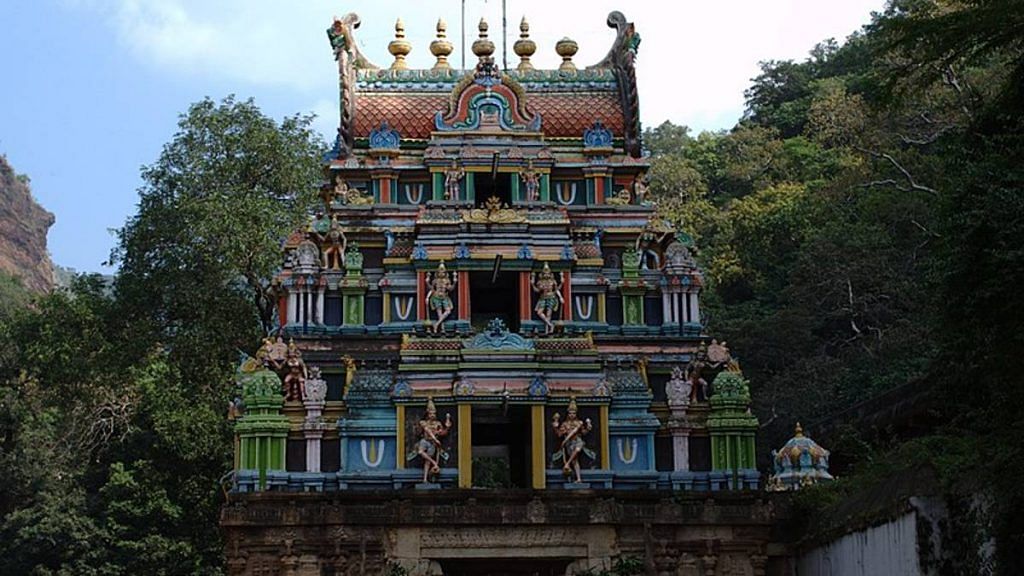New Delhi: “Why should religious places not be left to religious people?” the Supreme Court asked Friday while refusing to interfere with the Andhra Pradesh High Court’s order that quashed the state government’s decision to appoint an “executive officer” to control and manage the affairs of Ahobilam Temple in Kurnool.
The HC had last year set aside the appointment on the ground that it violated Article 26 (d) of the Constitution and affected the Mathadipathi’s (head of mutt) right of administration. It noted that the Ahobilam Temple was an integral part of the Ahobilam Mutt, situated in Tamil Nadu.
Article 26 (d) gives every religious group the right to administer an institution for religious and charitable purposes.
The Andhra Pradesh government had assailed the HC’s decision before the Supreme Court, questioning the reasons cited by the high court in its decision.
But the SC bench, led by Justice Sanjay Kishan Kaul, did not accede to the state government’s request to intervene with the HC’s decision. At the outset, on seeing the state government counsel, senior advocate Niranjan Reddy, Justice Kaul asked: “Why are you stepping into that (administration)?”
After hearing Reddy briefly, the bench, also comprising Justice A.S. Oka, told the senior counsel that “religious people” should deal with “religious places”.
“Let temple people deal with it. Why should religious places not be left to religious people?” the bench remarked.
Also read: SC no to tax exemption for ‘profit-minded’ educational institutions: Here’s what’s allowed
State’s argument versus HC’s stand
A division bench of the Andhra Pradesh High Court comprising Chief Justice Prashant Kumar Mishra and Justice D.V.S.S. Somayajulu had overturned the state government’s decision to appoint an executive officer to the Ahobilam Temple.
Turning down the state’s view that the temple and mutt were distinct entities, the HC had said that merely because the temple and mutt were in different geographical locations, it didn’t mean that the temple ceased to be part of the mutt.
The HC referred to various historic books, literature and archeological data to conclude that the temple and mutt were founded and administered by Mathadipathis for many decades now.
The HC took the view that the general power of supervision and control of the mutt is not given to the state. A mutt’s affairs should be sparingly interfered with and only when there are valid grounds such as mismanagement, etc.
In the present case, the HC held, the records did not warrant the state’s intervention or appointment of an executive officer.
The HC gave its order on a petition filed by a few devotees who said that under the Andhra Pradesh Charitable and Hindu Religious Institutions and Endowments Act, the state did not have the authority to appoint an executive officer for either the mutt or the temple.
The mutt, the petitioners had contended, is given a special status and has the right to manage its own affairs.
In its appeal before the SC, the state government argued that the HC had erred in drawing its conclusion that the temple was intrinsically linked with the Ahobilam Mutt and thus came within the definition of the term “mutt”.
“The temple’s inclusion in the definition of mutt is simply incongruous,” the state submitted in its appeal.
According to the state, a temple can never be part of a mutt or the same as a mutt, since they are two separate individual juristic entities and maintain their own separate accounts. The temple is a public place of religious worship with unfettered access to the Hindu community.
“It is axiomatic that the state’s Endowments Commission ought to have administrative control over it, especially since large amounts of public fund are involved,” the state submitted.
The Endowments Commission’s right to appoint an executive officer is specific to the temple being a separate juristic entity and in no way infringes on the right and control of the Mathadipathi over the affairs of the mutt, which is a separate entity, the state said.
Dedicated to and for the benefit of the Hindu community, the temple allows unfettered access to its devotees, the state’s petition stated, underlining its distinction from the mutt.
“The subject temple, without any demur, has been paying the statutory contributions to the Common Good Fund towards Audit Fee, Endowments Administrative Fund and Archaka Welfare Fund, at par with other temples under the Act,” the state added, as it stressed on the temple’s public character.
While the temple is in Kurnool, the mutt is in Tamil Nadu. Therefore, there can truly be “no question of the juristic entities being one and the same, even if they are associated with each other by way of history, apocryphal text and common religious practices,” the Andhra Pradesh government said in its appeal to the SC.
The state had also pointed out that the appointment of an executive officer was done to “put an end to the misuse of temple funds”.
(Edited by Nida Fatima Siddiqui)
Also Read: ‘System is deprived of talent’ — Ex-CJI UU Lalit admits delay in appointment of judges
